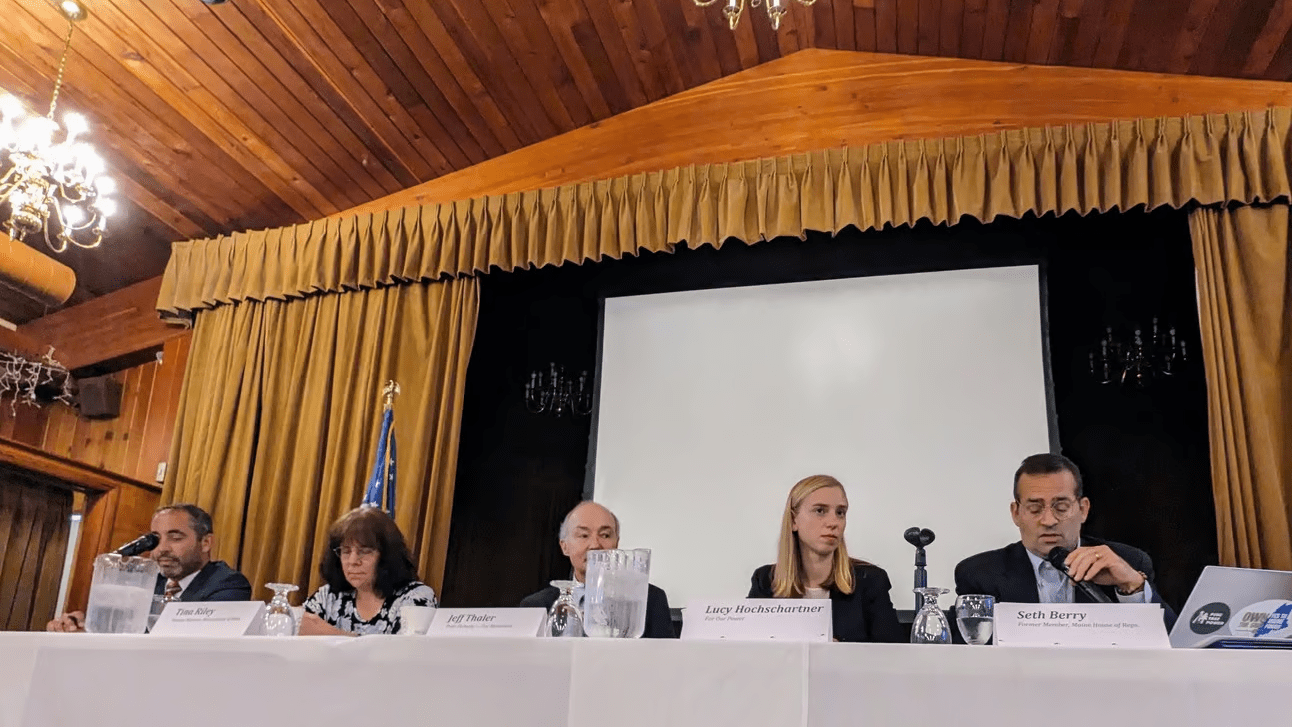By now you’ve surely seen the many ads, op-eds and yard signs blanketing the state both for and and against Pine Tree Power — a new, statewide, nonprofit electric utility proposed by Question 3 on the Maine ballot this November.
Governor Janet Mills used her weekly radio address on Wednesday to urge Mainers to reject the proposal, which would force Central Maine Power and Versant Power to sell off their infrastructure and workforces to the new utility. Mills, a Democrat, vetoed a version of this plan in legislative form two years ago.
Her radio address followed many talking points that have been heavily used by the utilities in their ongoing campaign against the referendum — raising the risk of lengthy litigation, potential for politicization on the board that would run the new utility, and a price tag of $13.5 billion.
These and many other claims were up for debate at a Question 3 forum hosted by the business network E2Tech in Augusta on Tuesday.
The two sides did agree on one thing: This proposal presents a stark choice about Maine’s energy future. Should we move forward within the status quo or take a big leap into something new?
Voters, according to both sides of the debate, can either trust CMP and Versant, and trust state lawmakers’ and regulators’ efforts to hold the utilities accountable for improving rates, reliability, service and climate readiness — or they can try to realize those improvements via an alternate model, one akin in many ways to a municipal power & light district or a rural electric cooperative.
Seth Berry, a former Democratic state representative from Bowdoinham and the original architect of the Pine Tree Power proposal, said the new utility’s nonprofit structure would allow cheaper grid upgrades to respond to climate change.
“The grid … is the lifeline to address that future, to make the planet livable. That lifeline needs to be governed by and for the people,” Berry said at the debate. “We need to harden the grid, and this is where the savings comes in.”
But to Tina Riley, also a former Democratic state rep from Jay who represents CMP customers on the state Public Utilities Commission’s Electric Ratepayer Advisory Council, this plan’s supporters are “rolling the dice.”
“Ideologically, I really like consumer-owned utilities. … Pragmatically, though, this is a huge risk,” she said. “Of all the guesses that both sides of this argument are making about how it will turn out, the reality is that we won’t know until it happens.
“So the question is for me,” Riley continued, “is, am I better off using the regulatory structure that we already have, that we’ve begun to really push to get the utilities back to where we want them after a long period of kind of letting them run rampant? I mean, people got really angry (at CMP and Versant) for a reason — and now we’re seeing a whole lot of improvements.”
She pointed to a bill passed last year, first proposed by Gov. Mills, that created a new “report card” system of utility performance standards and penalties.
It says the state Public Utilities Commission can consider forcing a sale of Maine’s utilities if they consistently fall short. Mills’ initial proposal specifically referenced a consumer-owned alternative here, but that didn’t make it into the final version, as I reported for Spectrum News Maine at the time.
The passage of Question 3 would trigger that transition process to consumer ownership. But debaters differed on key details of cost, scope, timeline and more.
The utilities’ backers foresee potentially “decades” of litigation over this change, as did Mills in her recent address; Pine Tree Power expects a much shorter process.
As for that oft-cited potential $13.5-billion price — Jim Cohen, an attorney and former Portland mayor debating for CMP-funded political group Maine Affordable Energy, said this number is based in part on an expectation that the current utilities will sell for at least two times their market value. Pine Tree Power and multiple economic analyses think this value multiplier will instead be 1.5, which would mean a lower cost to buy the utilities’ assets.
“We think we’re not going to know an answer until probably 2030,” Cohen said during the debate. “It could be a different number — we don’t know.”
Pine Tree Power emphasizes that ratepayers would elect some of the overseers of this new system, unlike under CMP and Versant. On this point, Riley raised the specter of political influence, envisioning campaign funding for prospective utility board members “flowing from petroleum companies” and saying there’s no guarantee the elected members would be “climate activists.”
Lucy Hochschartner, the deputy campaign manager for Our Power, which backs Question 3, noted that CMP and Versant’s parent companies are also invested in fossil fuels through their ownership of various natural gas power plants.
She said the law Question 3 would enact specifically requires climate expertise on the new utility’s board and mandates that the company “assist the state in rapidly meeting or exceeding (its) climate action plan goals.”
The governor’s 2022 utility accountability bill requires CMP and Versant to file 10-year climate plans every three years beginning this December, detailing “specific actions for addressing the expected effects of climate change on the utility’s assets needed to transmit and distribute electricity to its customers.”
But Hochschartner said she sees hope for more committed and lower-cost utility climate action in Pine Tree Power. She argued that the current utilities and their regulatory paradigm serve only utility interests and simply haven’t done enough to address the urgent needs of both customers and the planet.
“There are certain things that we do know, and what we do know is that CMP and Versant are not working for us. It’s not their job to work for us,” she said. “We talked about extreme circumstances, and that’s what we’re in — we are in a climate crisis and we are in an affordability crisis. … We need a certainty that we will have a utility that is working for us, so that we can trust it.”
The debate delved deep into various case studies from other consumer-owned utilities across the country, as well as how and when ratepayers may see savings from the proposed new utility and many other complex, crucial details.
Update: This article has been updated to correct Tina Riley’s title.







